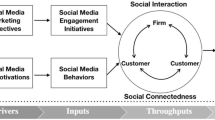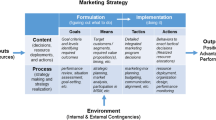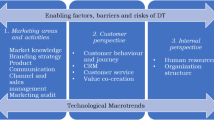Abstract
Marketing’s intellectual health requires indigenous theory development. However, marketing is a discipline that, almost exclusively, imports its concepts and theories from other disciplines and applies them to marketing issues. Articles that either develop indigenous marketing theory or use such theory as a foundation for empirical research are notably absent from marketing journals. A major reason for the absence of indigenous marketing theory is the lack of well-developed procedures and approaches for developing theories and writing conceptual articles. This article proposes, explicates, and illustrates with a concrete example (i.e., service-dominant (S-D) logic) an approach to theory development in marketing that is labeled the “foundational premises, inductive realist approach.” Although this approach is not an algorithmic procedure for theory development, it can provide a valuable conceptual framework for furthering the development of indigenous marketing theory.

Similar content being viewed by others
References
Alderson, W. (1937). A marketing view of competition. Journal of Marketing, 1(3), 189–190.
Alderson, W. (1957). Marketing behavior and executive action. Homewood: Richard D. Irwin.
Alderson, W. (1965). Dynamic marketing behavior. Homewood: Richard D. Irwin.
Bastiat, F. (1860). Harmonies of political economy. Patrick S. Sterling, trans. London: J. Murray.
Bolton, R. N. (2006). Foreword. In R. F. Lusch & S. L. Vargo (Eds.), The service-dominant logic of marketing: Dialog, debate, and directions (pp. x). Armonk: M.E. Sharpe.
Clark, T., Key, T. M., Hodis, M., & Rajaratnam, D. (2014). The intellectual ecology of mainstream marketing research: an inquiry into the place of marketing in the family of business disciplines. Journal of the Academy of Marketing Science, 42(2014), 223–241.
Constantin, J. A., & Lusch, R. F. (1994). Understanding resource management. Oxford: The Planning Forum.
Day, G. (1994). The capabilities of market-driven organization. Journal of Marketing, 58(October), 37–52.
Dixon, D. F. (1990). Marketing as production: the development of a concept. Journal of the Academy of Marketing Science, 18, 337–343.
Frazier, G. L. (2011). From the incoming editor. Journal of Marketing, 75, 1.
Hunt, S. D. (1983). General theories and the fundamental explananda of marketing. Journal of Marketing, 47, 9–17.
Hunt, S. D. (2000). A general theory of competition: Resources, competences, productivity, economic growth. Thousand Oaks: Sage Publications.
Hunt, S. D. (2010). Marketing theory: Foundations, controversy, strategy, resource-advantage theory. Armonk: M.E. Sharpe.
Hunt, S. D. (2011). Theory status, inductive realism, and approximate truth: no miracles, no charades. Marketing Theory, 11(4), 483–489.
Hunt, S. D. (2012). Explaining empirically successful marketing theories: the inductive realist model, approximate truth, and market orientation. AMS Review, 2(1), 5–18.
Hunt, S. D. (2013). The inductive realist model of theory generation: explaining the development of a theory of marketing ethics. AMS Review, 3(2), 67–77.
Hunt, S. D. (2018). Advancing marketing strategy in the marketing discipline and beyond: from promise, to neglect, to prominence, to fragment (to promise?). Journal of Marketing Management, 34(1), 1–36.
Hunt, S. D., & Arnett, D. (2006). Toward a general theory of marketing: Resource-advantage theory as an extension of Alderson’s theory of market processes. In B. Wooliscroft, R. Tamilia, & S. Shaprio (Eds.), Twenty-first century guide to Aldersonian marketing thought. Boston: Kluwer Academic.
Hunt, S. D., & Madhavaram, S. (2019). Adaptive marketing capabilities, dynamic capabilities, and renewal competences: the “outside vs. inside” and “static vs. dynamic” controversies in strategy. Industrial Marketing Management. https://doi.org/10.1016/j.indmarman.2019.07.004.
Hunt, S. D., & Morgan, R. M. (1995). The comparative advantage theory of competition. Journal of Marketing, 59, 1–15.
Hunt, S. D., & Morgan, R. M. (1996). The resource-advantage theory of competition: dynamics, path dependencies, and evolutionary dimensions. Journal of Marketing, 60, 107–114.
Hunt, S. D., & Morgan, R. M. (1997). Resource-advantage theory: a snake swallowing its tail or a general theory of competition? Journal of Marketing, 61, 74–82.
Hunt, S. D., Muncy, J. A., & Ray, N. M. (1981). Alderson’s general theory of marketing: A formalization. In B. M. Enis & K. J. Roering (Eds.), Review of marketing (pp. 267–282). Chicago: American Marketing Association.
Layton, R. A. (2011). Towards a theory of marketing systems. European Journal of Marketing, 45(1–2), 259–276.
Lehmann, D. R., McAlister, L., & Staelin, R. (2011). Sophistication in research in marketing. Journal of Marketing, 75, 155–165.
Lusch, R. F., & Vargo, S. L. (2014). Service-dominant logic: Premises, perspectives, possibilites. Cambridge: Cambridge University Press.
MacInnis, D, J. (2011). A framework for conceptual contributions in marketing. Journal of Marketing, 75(4), 136–154.
Merwe, R., Berthon, P., Pitt, L., & Barnes, B. (2010). Analysing theory networks: identifying the pivotal theories in marketing and their characteristics. Journal of Marketing Management, 23(3/40), 181–206.
Nickles, T. (1980). Scientific discovery: Case studies. The Netherlands: D. Reidel Publishing Company.
Palmatier, R. W., & Crecelius, A. T. (2019). The “first principles” of marjeting strategy. AMS Review, 9, 5–26.
Piercy, N. (2002). Research in marketing: teasing with trivia or risking relevance. European Journal of Marketing, 36(30), 250–363.
Popper, K. R. (1959). The logic of scientific discovery. New York: Harper and Row.
Reichenbach, H. (1938). Experience and prediction. Chicago: University of Chicago Press.
Rust, R. (1998). What is the domain of service research? Journal of Service Research, 1, 107.
Rust, R. T. (2006). From the editor: the maturation of marketing as an academic discipline. Journal of Marketing, 70, 1–2.
Schaffner, K. (1974). Logic of discovery and justification in regulatory genetics. Studies in History and Philosophy of Science, 4(4), 349–385.
Shaw, A. W. (1912). Some problems in market distribution. Quarterly Journal of Economics, 12, 706–765.
Sheth, J., Sisodia, R. S., & Sharma, A. (2000). The antecedents and consequences of customer-centric marketing. Journal of the Academy of Marketing Science, 28, 55–66.
Slater, S. F., & Narver, J. C. (1995). Market orientation and the learning organization. Journal of Marketing, 59, 63–74.
Varadarajan, R. (2010). Strategic marketing and marketing strategy: domain, definition, fundamental issues and foundational premises. Journal of the Academy of Marketing Science, 38, 119–140.
Vargo, S. L., & Lusch, R. F. (2004). Evolving to a new dominant logic for marketing. Journal of Marketing, 68, 1–17.
Vargo, S. L., & Lusch, R. F. (2006). The service-dominant logic of marketing: Dialog, debate, and directions. Armonk: M.E. Sharpe.
Vargo, S. L., & Lusch, R. F. (2008). Service-dominant logic: continuing the evolution. Journal of the Academy of Marketing Science, 36(1), 1–10.
Vargo, S. L., & Lusch, R. F. (2016). Institutions and axioms: an extension and update of service-dominant logic. Journal of the Academy of Marketing Science, 44, 5–23.
Wooliscroft, B., Tamilia, R. D., & Shapiro, S. J. (2006). A twenty-first century guide to Aldersonian marketing thought. Boston: Kluwer Academic Publishers.
Yadav, M. S. (2010). The decline of conceptual articles and implications for knowledge development. Journal of Marketing, 74(1), 1–19.
Zaltman, G., LeMasters, K., & Heffring, M. (1982). Theory construction in marketing: Some thoughts on thinking. New York: Wiley.
Zeithaml, V. A., Jaworski, B. J., Kohli, A. K., Tuli, K. R., Ulaga, W., & Zaltman, G. (2020). A theories-in-use approach to building marketing theory. Journal of Marketing, 84(1), 32–51.
Zytkow, J. M., & Simon, H. A. (1988). Normative systems of discovery and logic of search. Synthese, 74, 65–90. Boston: Kluwer Academic Publishers.
Acknowledgments
The author thanks the editor and two anonymous reviewers for helpful comments on a draft of this article.
Author information
Authors and Affiliations
Corresponding author
Additional information
Publisher’s note
Springer Nature remains neutral with regard to jurisdictional claims in published maps and institutional affiliations.
Rights and permissions
About this article
Cite this article
Hunt, S.D. Indigenous theory development in marketing: the foundational premises approach. AMS Rev 10, 8–17 (2020). https://doi.org/10.1007/s13162-020-00165-w
Received:
Accepted:
Published:
Issue Date:
DOI: https://doi.org/10.1007/s13162-020-00165-w




